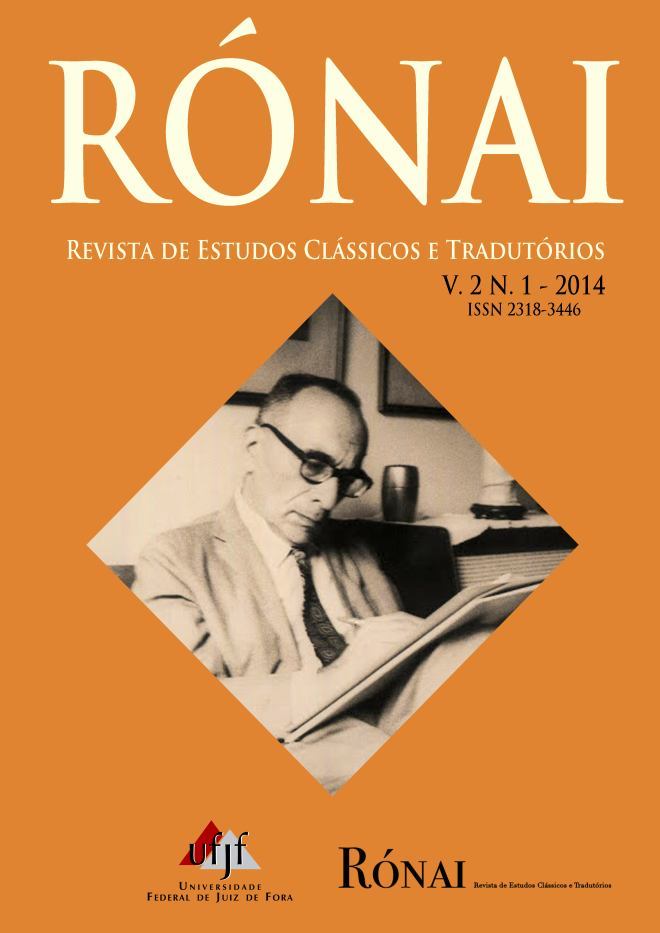The mythical allusions in Pindar’s Olympic Ode II: A literary-critical analysis
Keywords:
lyric poetry, epinician, myth, Pindar, Olympian ode IIAbstract
The aim of this article is to do a critical-literary analysis of the epinician, the second Olympian, which is considered one of Pindar´s masterpieces. As the mythical element is important in this subgenre of archaic lyric poetry, of which the main objective is to praise the winning athlete of a competition, the funcion of the myth will be investigated, as well as its relation to the athlete to whom the ode is destined, that is Theron of Acragas. Other elements will also be observed, like the gnomic sentences, the poet´s first-persons references and the praise intended towards the athlete.
Downloads
References
CAREY, Chris. Genre, occasion and performance. In: BUDELMANN, Felix (ed.) The Cambridge Companion to Greek Lyric. Cambridge: Cambridge University Press, 2010. p. 21 – 38.
DONLAN, Walter. The Aristocratic Ideal and Selected Papers. Chicago: BolchacyCarducci Publishers, Inc., 1999. p. 77-111.
GRIFFITH, R. Drew. ލOedipusʽs Bloodthirsty Sons: Love and Strife in Pindarʽs Second "Olympian Ode".ތ Classical Antiquity, vol. 10, no. 1, 1991. p. 46-58.
HESÍODO. Hesiodi theogonia, opera et dies, scutum, fragmenta. ed. F. Solmsen/R. Merkelbach/M. L. West, Oxford 1970. Disponível em: <http://www.hs-augsb de/urg.~harsch/graeca/Chronologia/S_ante08/Hesiodos/hes_erga.html>. Acesso em: 22 de julho 2014
HIRATA, Elaine F. V. ލAs odes de Píndaro e as tiranias siciliotas.ތ Clássica, vv. 9/10, 1996-7. p. 61-72.
HOMERI. Ilias. Ed. D. B Monro/Th. W. Allen, Oxford, Oxford University Press. 1920. Disponível em: <http://www.hs-augsb de/graeca/Chronologia/S_ante08/Homeros/hom_ili00.html>. Acesso em: 22 de julho 2014
HOMER. The Odyssey. With an English Translation by A. T. Murray, PH. D. in two volumes. Cambridge, MA., Harvard University Press; London, William Heinemann, Ltd.1919. Disponível em: <http://www.hs-augsb de/graeca/Chronologia/S_ante08/Homeros/hom_od00.html>. Acesso em: 22 de julho 2014
KIRKWOOD, Gordon. Selections from Pindar. Chicago: American Philological Association, 1982. pp. 3 -5, 61-77.
LEFKOWITZ, Mary R. First-Person Fictions: Pindarʽs Poetic I. Oxford: Clarendon Press, 1991. p. 1 -70.
LOURENÇO, Federico. ލLirica coral e monódica: uma problemática revistada. Humanitas 61, 2009. p.19- 29.
MALHADAS, Daisi. Píndaro - odes aos príncipes da Sicília. Tradução com introdução e notas. São Paulo: Universidade Estadual Paulista, Faculdade de Filosofia, Ciências e Letras de Ararquara, 1976. p. 7-27.
ONELLEY, Glória Braga; PEÇANHA, Shirley Fátima G. de A. Tradução de fragmentos de poetas gregos. www.academia.edu/.../O_epinicio_pindarico_uma_leitura_de_Olimpica_
NISETICH, Frank J. Immortality in Acragas: Poetry and Religion in Pindarʽs Second Olympian Ode.ތ Classical Philology. Vol. 83, no. 1, 1988. p. 1-19.
RACE, William. H. Pindar. Boston: Twayne Publishers, 1986. pp. 19-35; 67 -73.
ROCHA PEREIRA, Maria H. da. Estudos de história da cultura clássica: I Volume – Cultura clássica. Lisboa: Fundação Calouste Gulbenkian, 2006. p. 214-36.
_____. Notas a um passo de Píndaro.ތ Humanitas 4, 1952. p. 7 – 12.
SEGAL, Charles. Lírica coral arcaica. In: EASTERLING, P. E.; KNOX, B. M. W. (eds.) Historia de la literatura clásica (Cambridge University) I – Literatura Griega. Tradução por Federico Zaragoza Alberich. Madrid: Editorial Gredos, S.A.,1990. p. 188-92.
_____. Lírica coral en el siglo V. In: EASTERLING, P. E.; KNOX, B. M. W. (eds.) Historia de la literatura clásica (Cambridge University) I – Literatura Griega. Tradução por Federico Zaragoza Alberich. Madrid: Editorial Gredos, S.A.,1990. p. 249-63.
SOLMSEN, Friedrich. Achilles on the Islands of the Blessed - Pindar vs. Homer and Hesiod. American Journal of Philology. Vol. 103, 1982. p. 19-24.
SUAREZ DE LA TORRE, Emilio. ލPíndaro y la religion griega.ތ Cuadernos de Filología Clásica (Estudios griegos e indoeuropeos) 3, 1993. p. 67-97.
SULLIVAN, S. D. ލAspects of the ”fictive I” in Pindar: address to psychic enteties. Emerita, vol. 70 - 1, 2002. pp. 83-93, 102.
TORRES, Daniel A. La escatalogia en la lírica de Píndaro e sus fuentes. Buenos Aires: Editorial de la Faculdad de Filosofia y Letras Universidad de Buenos Aires. 2007. p. 267-360.
WOODBURY, Leonard. ލEquinox at Acragas: Pindar, Ol. 2.61-62.ތ Transactions and Proceedings of the American Philological Association, v. 97, 1966. p. 597-616.
Downloads
Published
How to Cite
Issue
Section
License
Copyright (c) 2015 Rónai – Revista de Estudos Clássicos e Tradutórios

This work is licensed under a Creative Commons Attribution 4.0 International License.
Copyright
The authors of the published contributions agree with the following items:
1. The authors keep the copyright and convey to the journal the right of first publication, the work being licensed under a Creative Commons Attribution License 4.0 International.
2. The authors are allowed and stimulated to publicize and distribute their work online after the publication in the journal, recognizing first publication in this journal.
3. The authors of the approved works authorize the journal to distribute their content, after publication, for reproduction in content indexes, virtual libraries and similars.
For more information about Creative Commons Attribution License 4.0 International, please, go to: https://creativecommons.org/licenses/by/4.0/deed.en
Editorial exemption
The authors of the published contributions are entirely and exclusively responsible for their contents. Its content does not represent an official position of Rónai - Revista de Estudos Clássicos e Tradutórios neither of Faculdade de Letras da Universidade Federal de Juiz de Fora or their partner institutions.



